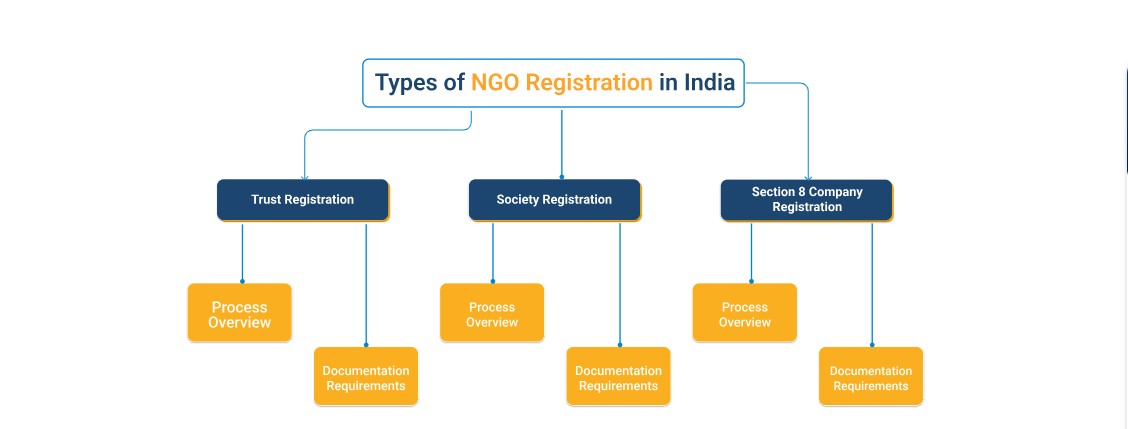NGO Registration in India
NGO registration is the process of legally setting up an organization to do social work in India. It helps the NGO gain trust, work transparently, and get benefits like tax exemptions. NGOs can be registered as a Trust, Society, or Section 8 Company to carry out their activities smoothly.


Types of NGO Registration in India


Classification of NGOs in India
NGOs in India can be classified based on their orientation (purpose of work) and level of operation (scale of work).
Based on Orientation (Purpose of Work):
Charitable NGOs – Provide direct relief and support (e.g., food distribution, shelters).
Service-Oriented NGOs – Offer healthcare, education, and other essential services.
Participatory NGOs – Involve communities in decision-making and development projects.
Empowerment NGOs – Focus on rights, advocacy, and self-sufficiency programs.
Based on Level of Operation (Scale of Work):
Community-Based Organizations (CBOs) – Work at the grassroots level for local communities.
City or District-Level NGOs – Operate within a city or district, addressing regional issues.
National NGOs – Work across multiple states, tackling broader social problems.
International NGOs – Operate in multiple countries, addressing global challenges.
Why Is NGO Registration Required?
Credibility – Builds trust and attracts donors, collaborators, and supporters.
Operational Growth – Helps expand local operations and increase community impact.
Resource Expansion – Allows access to tax exemptions, funding, and volunteers.
Tax Benefits – Registered NGOs enjoy tax exemptions under the Income Tax Act.
Asset & Liability Management – Enables NGOs to own assets and manage finances legally.
Stamp Duty Exemption – Section 8 companies get stamp duty benefits, reducing costs.


Eligibility to Start an NGO
Private Limited Companies – Require a minimum of 2 directors and can have up to 200 members.
Public Limited Companies – Require a minimum of 3 directors with no limit on members.
No Registration Fee – NGOs do not have to pay a registration fee.
Registration Fees
The registration fee varies based on the country, type of NGO, and governing body requirements. Additional expenses may include documentation, legal compliance, and regulatory requirements.
Benefits of NGO Registration
The following are the benefits of NGO Registration in India:
Tax Exemption – NGOs under 12A & 80G enjoy tax benefits.
Asset Ownership – Can own and manage assets legally.
Financial Transparency – Bank accounts under the NGO’s name build trust.
Credibility – Increases trust among donors and collaborators.
Stability & Succession – Ensures long-term impact and continuity.
Access to Credit – Can apply for loans to support initiatives.
Name Protection – Prevents unauthorized use of the NGO’s name.
Banking Requirement – Corporate bank accounts enhance financial transparency.
Common Problems People Face in NGO Registration
Starting an NGO is a great step toward social change, but many people face challenges during the registration process. Here are some common problems:
Confusion About NGO Type- Many people don’t know whether to register as a Trust, Society, or Section 8 Company.
Complicated Legal Process- The registration process involves many documents and legal steps, making it difficult for beginners.
Document Issues- People often submit incorrect or incomplete documents, leading to delays or rejection.
Tax Exemptions & Funding Challenges- Many NGOs struggle to get tax benefits (12A, 80G) and foreign funding (FCRA).
Banking & Financial Management Issues- NGOs fail to open a bank account or maintain proper financial records, affecting transparency.
Solution
Starting an NGO is a great initiative, but many people face challenges during registration. Here are some common problems and how Clearline Financial Accounting Services can provide solutions:
Clearline Financial Accounting Services handles all documentation, ensures compliance with regulations, and simplifies the process for you.
We guide you in selecting the best structure based on your NGO’s mission, goals, and operational needs.
We prepare and verify all necessary documents to avoid rejections and delays.
We assist in applying for tax exemptions and foreign funding approvals, ensuring financial benefits for your NGO.
We help with bank account setup and provide accounting services to maintain financial transparency.
We offer continuous financial and legal support, ensuring your NGO remains compliant with all regulations.
How Clearline Financial Accounting Services Can Help
We make NGO registration easy by handling all the paperwork, legal formalities, and financial management. Our services include:
Choosing the right NGO type (Trust, Society, or Section 8 Company)
Preparing and submitting all required documents
Helping with tax exemptions (12A, 80G) & FCRA approval
Setting up a bank account and managing finances
Ongoing legal and financial support for your NGO
With Clearline Financial Accounting Services, you don’t have to worry about registration problems. We handle everything so you can focus on making a difference!
Services
Your trusted partner for financial success.
Support
Contact Us
+91-9975791135
© 2025. All rights reserved.
